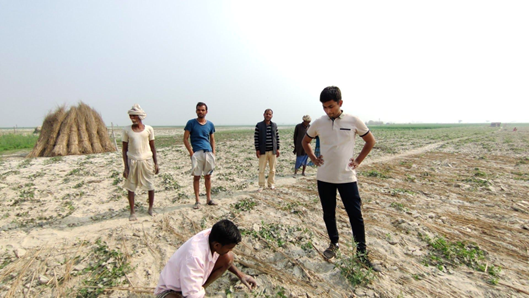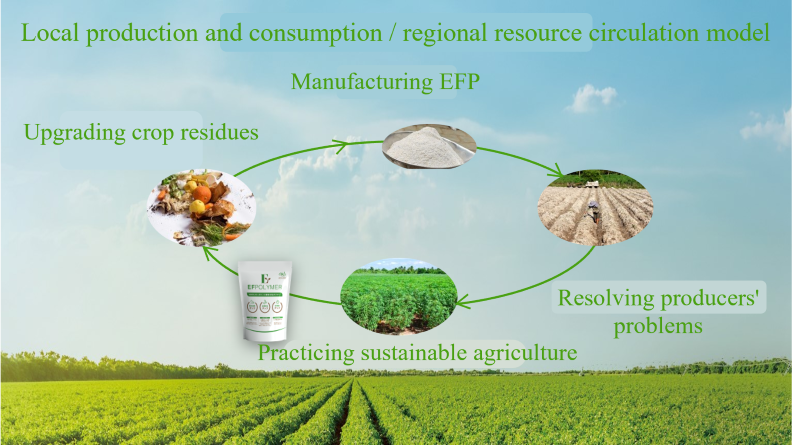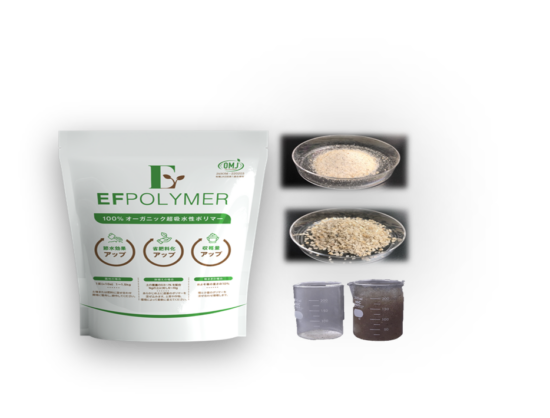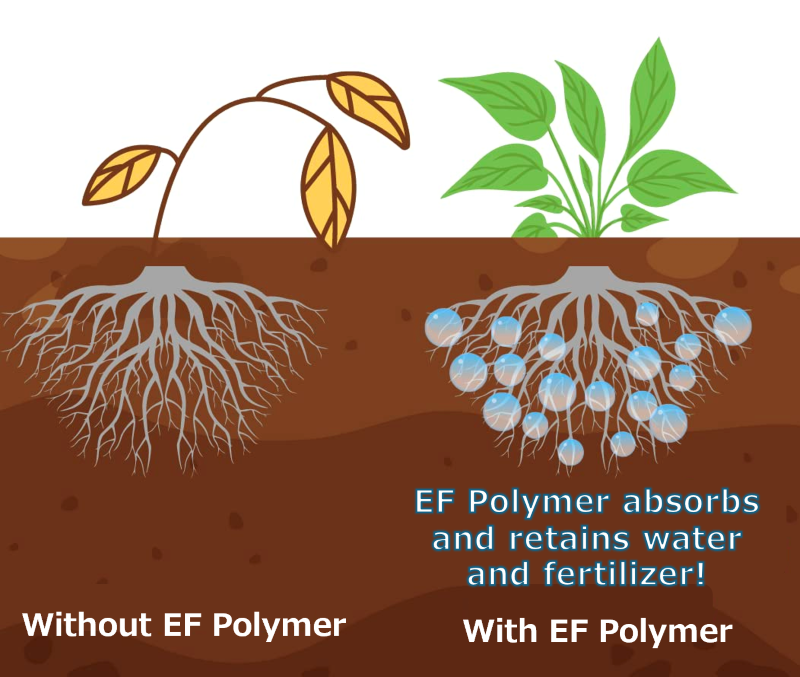- Knowledge Overview
-
The EF Polymer, an abbreviation for the Eco-Friendly Polymer, is a 100% organic, highly absorbent polymer made from crop residues. Its main features are that i) it completely returns to soil in about one year (100% biodegradable), ii) improves soil’s water and fertility retention, iii) creates healthy soil and is environmentally friendly, and iv) reduces cultivation costs and increases yields. It was originally designed to combat water shortages and improve the efficiency of agricultural production, allowing for the cultivation of stable crops (even in harsh environments, such as during droughts) and contributing to the realization of sustainable agriculture. In recent years, its use has expanded in various fields, such as home gardening, horticulture, landscaping, disaster prevention, and civil engineering. It has been used in many fields, both domestically and internationally, mainly in agriculture, including for vegetable (tomatoes, carrots, okra, onions, broccoli, and celery), field crop (potatoes and soybeans), and rice cultivation.
- Background (history and development)
-
Narayan, the founder of EF Polymer Incorporated and developer of the EF Polymer, was born and raised in a small village of only a few dozen villagers in Rajasthan, India. Seeing his family and fellow villagers struggling, such as when they worked hard to cultivate crops, which were subsequently destroyed by drought within some years or were beset by poor harvests in other years, he wondered if he could somehow use the power of science to help them (Figure 1). Since high school, Narayan has been interested in the water retention capacity of superabsorbent polymers. However, since existing products were petroleum-derived chemicals, he considered them inadequate for sustainable farmland use, leading to a decision to develop an alternative. After conducting basic research in high school and university, Narayan succeeded in devising a completely organic superabsorbent polymer. To put this technology to practical use, he applied for a program at the Okinawa Institute of Science and Technology Graduate University (OIST) and came to Japan on his own.
Narayan established the foundation for manufacturing completely organic superabsorbent polymers at the OIST and founded EF Polymer Incorporated in Okinawa in 2020, commencing production and sales in India. In Japan, sales of the EF Polymer began in 2021, primarily for agriculture.
As its effectiveness in the agricultural field has been verified, in 2022, it proved potentially effective in desert greening and afforestation, and afforestation trials are underway in the arid regions of Inner Mongolia and in seedling cultivation in Japan.
At present, in addition to upgrading the EF Polymer and developing new products, research and development is also being conducted to use the EF Polymer in new applications (daily necessities, cosmetics, etc.)

Figure 1. Narayan’s Village (Rajasthan, India) - How to Apply Knowledge
-
Characteristics of the knowledge
The EF Polymer is a 100% organic superabsorbent polymer made from crop residues that have been discarded until now. It is currently the only superabsorbent polymer in the world that is completely biodegradable and has been certified by the Organic JAS and Ecocert in the United States and Europe.
Another major feature is that the company aims to form a local production and consumption/regional resource circulation model through sustainable agriculture, such as by stabilizing yields by EF Polymer and producing products from crop residues (Figure 2).

Figure 2. Characteristics of the knowledge (local production and consumption / regional resource circulation model) Effects
When EF Polymer is mixed into soil, it absorbs water in the soil at levels about 50 times its weight and releases it when the soil dries. Compared to conventional oil-derived water-absorbent polymers, it is completely biodegradable. It has a strong enough water retention capacity that does not interfere with the water absorption function of the roots, making it effective in promoting the growth of crops and trees under water-stressed environments (Figure 3).

Figure 3: EF Polymer products How to use
In agriculture, the EF Polymer is mixed into the soil at the seedling stage, and in fields, it is mixed into soil by spraying or tilling before planting, or a small amount is added to planting holes at the time of planting. In forestry, it can also support the rooting of seedlings through seedling cultivation, application to planting holes, and mixing into soil for backfilling (Figure 4).
The optimal amount and application location vary depending on the soil properties and crop/tree species; hence, confirming the optimal amount through preliminary tests before considering application is necessary.

Figure 4. EF Polymer effect - Examples of Applying Knowledge
-
In the agricultural field, it is used in Asian and Western countries, mainly in Japan and India. For example, it is used on many vegetables, such as tomatoes, carrots, okra, onions, potatoes, broccoli, celery, cabbage, and lettuce, as well as in field crops (potatoes, soybeans, sweet potatoes, and corn) and rice cultivation. It has also been verified to effectively reduce watering frequency in indoor and outdoor greening, gardening, and landscaping, prompting its use.
In the forestry field, its use has begun on a trial basis in seedling production and application when planting tree seedlings.
- Positioning and Characteristics of Knowledge in Japan
-
Japan does not appear to have many problems with droughts and water shortages. Nevertheless, in recent years, climate change has caused these problems in many parts of the country, including the absence of precipitation during periods when it used to rain and abnormally high temperatures in the summer. Moreover, labor shortages and aging in agriculture and forestry pose serious challenges, and a decline in the labor force available for watering is a major issue.
Under such circumstances, the use of the EF Polymer has been confirmed to have effects such as significantly reducing watering labor, improving the initial survival rate, and increasing yields, resulting in a gradual spread of its use. Moreover, although chemical superabsorbent polymers mixed into soil for agricultural and horticultural purposes have been commercially available until now, there have been concerns that they would remain in soil for too long or turn into microplastics during the decomposition process. In contrast, the EF Polymer is completely biodegradable within one year, leaving no room for such concerns, and the possibility of being used in organic farming is one of its major features.
Furthermore, because it can be sold at a price comparable to those of existing chemical superabsorbent polymers, and local production and consumption (onsite production) may be possible, it is considered to constitute an initiative that can significantly improve the return on investment (ROI) in the agriculture and forestry industries in developing countries.
- Owners/inheritors of knowledge
- EF Polymer Incorporated
- Related URLs (in Japanese)
- EF Polymer Incorporated: https://efpolymer.jp/
- Author (Affiliation)
-
EF Polymer Incorporated
Your Knowledge could start making a change, when issue is faced; in forest conservation, or in value chains to use forest resources in a sustainable way.


Your Feedback.